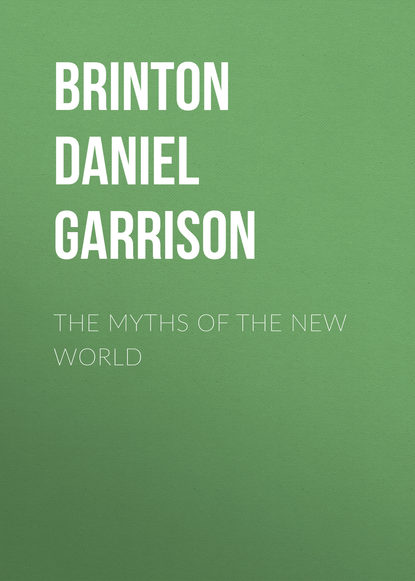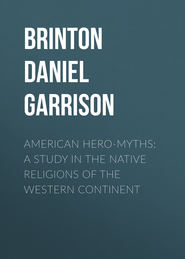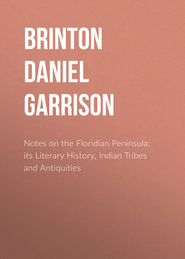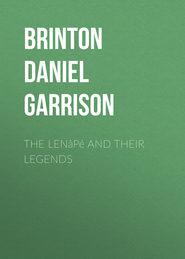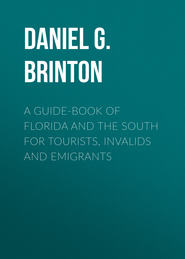По всем вопросам обращайтесь на: info@litportal.ru
(©) 2003-2024.
✖
The Myths of the New World
Настройки чтения
Размер шрифта
Высота строк
Поля
Mrs. Eastman, Legends of the Sioux, pp. 161, 212. In this explanation I depart from Prof. Schwarz, who has collected various legends almost identical with these of the Indians (with which he was not acquainted), and interpreted the precious crown or horn to be the summer sun, brought forth by the early vernal lightning. Ursprung der Mythologie, p. 27, note.
155
Cusic, u. s., pt. ii.
156
This remarkable relic has been the subject of a long and able article in the Revue Américaine (tom. ii. p. 69), by the venerable traveller De Waldeck. Like myself—and I had not seen his opinion until after the above was written—he explains the cruciform design as indicating the four cardinal points, but offers the explanation merely as a suggestion, and without referring to these symbols as they appear in so many other connections.
157
Schwarz, Ursprung der Mythologie, pp. 62 sqq.
158
“I have examined many Indians in reference to these details,” says the narrator, an Augustin monk writing in 1554, “and they have all confirmed them as eye-witnesses” (Lettre sur les Superstitions du Pérou, p. 106, ed. Ternaux-Compans. This document is very valuable).
159
Narrative of John Tanner, p. 355; Henry, Travels, p. 176.
160
Torquemada, Monarquia Indiana, lib. vi. cap. 31.
161
A. D’Orbigny, L’Homme Américain, i. p. 240.
162
Rivero and Tschudi, Peruvian Antiquities, 162, after J. Acosta.
163
Narrative of Oceola Nikkanoche, Prince of Econchatti, p. 141; Schoolcraft, Ind. Tribes, iv. p. 650.
164
The term in Maya is caput zihil, corresponding exactly to the Latin renasci, to be re-born, Landa, Rel. de Yucatan, p. 144.
165
Dumont, Mems. Hist. sur la Louisiane, i. p. 233.
166
Acosta, Hist. of the New World, lib. v. cap. 25.
167
Senate Report on Condition of Indian Tribes, p. 358: Washington, 1867.
168
Sahagun, Hist. de la Nueva España, lib. vi. cap. 37.
169
Ternaux-Compans, Pièces rel. à la Conq. du Mexique, p. 233.
170
Velasco, Hist. de la Royaume de Quito, p. 106, and others.
171
Whipple, Rep. on the Indian Tribes, p. 35. I am not sure that this practice was of native growth to the Cherokees. This people have many customs and traditions strangely similar to those of Christians and Jews. Their cosmogony is a paraphrase of that of Genesis (Squier, Serp. Symbol, from Payne’s MSS.); the number seven is as sacred with them as it was with the Chaldeans (Whipple, u. s.); and they have improved and increased by contact with the whites. Significant in this connection is the remark of Bartram, who visited them in 1773, that some of their females were “nearly as fair and blooming as European women,” and generally that their complexion was lighter than their neighbors (Travels, p. 485). Two explanations of these facts may be suggested. They may be descendants in part of the ancient white race near Cape Hatteras, to whom I have referred in a previous note. More probably they derived their peculiarities from the Spaniards of Florida. Mr. Shea is of opinion that missions were established among them as early as 1566 and 1643 (Hist. of Catholic Missions in the U. S., pp. 58, 73). Certainly in the latter half of the seventeenth century the Spaniards were prosecuting mining operations in their territory (See Am. Hist. Mag., x. p. 137).
172
Sprague, Hist. of the Florida War, p. 328.
173
Basanier, Histoire Notable de la Floride, p. 10.
174
Sahagun, Hist. de la Nueva España, lib. iii. app. cap. i.; Meyen, Ueber die Ureinwohner von Peru, p. 29.
175
Gabriel Thomas, Hist. of West New Jersey, p. 6: London, 1698.
176
Gama, Des. de las dos Piedras, etc., i. p. 36.
177
Garcia, Or. de los Indios, p. 109.
178
Oviedo, Rel. de la Prov. de Nicaragua, p. 41. The name is a corruption of the Aztec Quiauhteotl, Rain-God.
179





